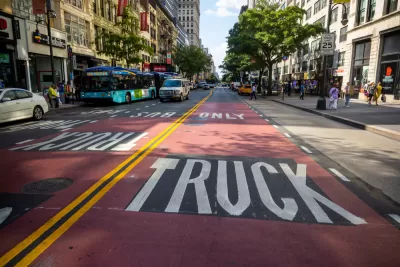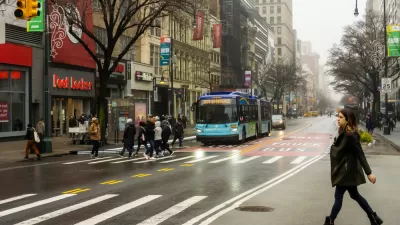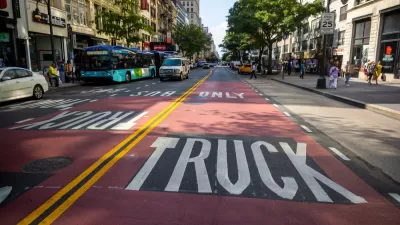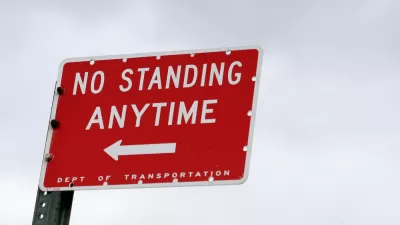Last week, 14th Street in Manhattan was closed to almost all varieties of automobile traffic, freeing up one of the slowest bus routes in the city. How will residents, workers, and commuters react?

Jake Offenhartz and Stephen Nessen report from New York City, where a pilot program launched last week to free buses from automobile congestion on 14th Street in Manhattan, after month of delays brought on by litigation.
Here's how the reporters describe the effect of the project, in case you missed earlier coverage:
The new pilot program went into effect at 6 a.m. on Thursday morning, effectively banning passenger vehicles between 3rd and 9th Avenues to make way for new dedicated lanes for the M14A/D buses. Trucks are still permitted to use the street, and local drivers, including for-hire vehicles, can make pickups and drop-offs, provided they take the first available right turn.
As noted in earlier stories about the 14th Street bus lane pilot project, lawsuits delayed the project until a court decision over the summer cleared the way for the project. Given the controversy surrounding the project, and its novelty in American cities, public opinion on the project will be important to the long-term viability of this project and others like it.
The reports find plenty of skepticism about the effects of the pilot project. A delivery driver with a penchant for parking illegally (as witnessed by the reporters) thinks the project will make traffic worse. An Uber driver says his rides are cancelling when they realize they have to walk an extra block.
The reporters note a lack of spillover traffic on side streets, as predicted by the lawsuit that delayed the project, but don't quote any bus riders or transit advocates on the day of the opening. For reviews from inside the bus, see an article by Amanda Luz Henning Santiago. Riders of the M14 bus report faster travel times and on-time arrivals to the office.
Yet another article by Vincent Barone reports bus riders rejoicing at the new speed of the bus and the relative calm of the remade 14th Street.
FULL STORY: 14th Street Car Ban Kicks Off With Cranky Drivers, Joyous Bus Riders

Planetizen Federal Action Tracker
A weekly monitor of how Trump’s orders and actions are impacting planners and planning in America.

Congressman Proposes Bill to Rename DC Metro “Trump Train”
The Make Autorail Great Again Act would withhold federal funding to the system until the Washington Metropolitan Area Transit Authority (WMATA), rebrands as the Washington Metropolitan Authority for Greater Access (WMAGA).

The Simple Legislative Tool Transforming Vacant Downtowns
In California, Michigan and Georgia, an easy win is bringing dollars — and delight — back to city centers.

The States Losing Rural Delivery Rooms at an Alarming Pace
In some states, as few as 9% of rural hospitals still deliver babies. As a result, rising pre-term births, no adequate pre-term care and harrowing close calls are a growing reality.

The Small South Asian Republic Going all in on EVs
Thanks to one simple policy change less than five years ago, 65% of new cars in this Himalayan country are now electric.

DC Backpedals on Bike Lane Protection, Swaps Barriers for Paint
Citing aesthetic concerns, the city is removing the concrete barriers and flexposts that once separated Arizona Avenue cyclists from motor vehicles.
Urban Design for Planners 1: Software Tools
This six-course series explores essential urban design concepts using open source software and equips planners with the tools they need to participate fully in the urban design process.
Planning for Universal Design
Learn the tools for implementing Universal Design in planning regulations.
Smith Gee Studio
City of Charlotte
City of Camden Redevelopment Agency
City of Astoria
Transportation Research & Education Center (TREC) at Portland State University
US High Speed Rail Association
City of Camden Redevelopment Agency
Municipality of Princeton (NJ)





























